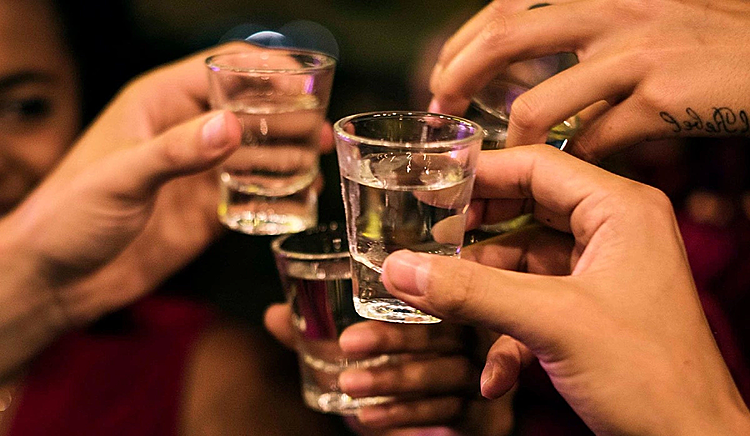The man, an office worker, had attended a wedding reception with friends. He explained that he had been busy all day, hadn't drunk enough water, and had been out in the sun. At the party, he consumed a large amount of alcohol without eating enough food. Later that night, he felt dizzy and broke out in a cold sweat. His wife, thinking he was just drunk, helped him to bed. Minutes later, he collapsed. His face drooped, his speech was slurred, and one side of his body was weak.
At Bach Mai Hospital, doctors diagnosed him with an ischemic stroke caused by a combination of severe hypotension, dehydration, and alcohol consumption. Thanks to prompt medical attention, his life was saved, but he faces a long road to recovery.
The Poison Control Center at Bach Mai Hospital previously treated a similar case involving a 30-year-old man who experienced vomiting, slurred speech, and arm weakness after a party. Tests ruled out methanol poisoning, but he had suffered a stroke due to excessive alcohol consumption and vomiting, which led to dehydration, blood clots, and ultimately, a blocked artery.
According to the World Health Organization, alcohol is a direct cause of more than 30 infectious diseases and 200 other conditions. In Vietnam alone, the Ministry of Health estimates that around 200,000 people suffer strokes annually, with alcohol abuse being a major risk factor.
"Many people believe that drinking 'real' or 'high-quality' alcohol won't harm their health, but they forget that excessive consumption can be life-threatening," warned Dr. Doan Du Manh, Deputy Director of the Cardiovascular and Stroke Center at Phuong Dong General Hospital. He highlighted the dangerous combination of alcohol, dehydration, and low blood pressure as key stroke risk factors.
When ethanol enters the body, it triggers a complex series of biological reactions. Alcohol dilates veins, disrupts heart rhythm, damages artery walls over time, and increases the risk of blood clots traveling to the brain or causing a hemorrhagic stroke.
The liver processes alcohol, creating toxic chemicals that cause inflammation and damage liver cells. This can lead to liver dysfunction, hepatitis, and eventually cirrhosis. The liver, responsible for producing clotting factors, becomes compromised, leading to a decrease in the quantity and quality of platelets. This can result in bleeding, including bleeding in the brain.
A 2019 Harvard University study revealed that alcohol can lower blood pressure for up to 12 hours after consumption due to ethanol's vasodilating effect and increased heart rate. When blood pressure drops below 90/60 mmHg, the brain doesn't receive sufficient oxygen and nutrients, causing headaches, dizziness, blurred vision, difficulty concentrating, and even fainting.
"A sudden and significant drop in blood pressure poses a high risk of stroke, especially for individuals with atherosclerosis who already have narrowed arteries," Dr. Manh explained.
Dr. Nguyen Tien Dung, Deputy Director of the Stroke Center at Bach Mai Hospital, added that stroke risk depends on a complex interplay of factors: personal medical history (stroke, cardiovascular disease, hypertension, diabetes), age, current health status, activity level, access to cool environments, dehydration, adherence to treatment, environmental factors (humidity, air pollution), and duration of exposure to high temperatures.
Rapid dehydration and electrolyte loss in hot weather can increase blood viscosity, reduce circulatory volume, and force the heart to work harder to pump blood. This increases the risk of blood clots, a leading cause of ischemic stroke.
Alcohol is a potent diuretic and also creates a false sense of fullness. Many people go to sleep after drinking without eating, leading to severe dehydration.
A 2020 study published in the journal Stroke found that dehydration reduces blood volume, thickens the blood, and promotes clot formation. Blood flow to the brain decreases, and the brain is highly sensitive to reduced blood supply.
"The combination of these three factors makes the brain vulnerable to acute ischemia, leading to stroke," Dr. Manh concluded.
 |
Alcohol is a direct cause of more than 30 infectious diseases and 200 other conditions. Photo: Henryford |
Alcohol is a direct cause of more than 30 infectious diseases and 200 other conditions. Photo: Henryford
To reduce the risk, doctors recommend drinking enough water daily (about 1.5-2 liters). Increase fluid intake during hot weather, after exercise, or after consuming alcohol to compensate for fluid loss. Men should limit alcohol intake to no more than two standard drinks per day, women to one, and avoid drinking more than 5 days a week. Avoid drinking on an empty stomach or when dehydrated.
One standard drink is equivalent to about 3/4 of a 330ml bottle or can of 5% beer, one 330ml glass of draft beer (beer alcohol content varies from 1% to 12%, typically around 5%), 100ml of 13.5% wine, or 30ml of 40% spirits. Low-alcohol or non-alcoholic beers typically contain 0.05% to 1.2% alcohol.
Individuals with heart disease, low blood pressure, or heart rhythm disorders should be especially cautious and should not discontinue blood pressure medication. If experiencing dizziness, lightheadedness, or unusual fatigue, check blood pressure immediately and rest. Long-term preventive measures include a healthy diet, limiting salt and animal fat, regular exercise, and routine health checkups to identify potential risks early.
Thuy Quynh












